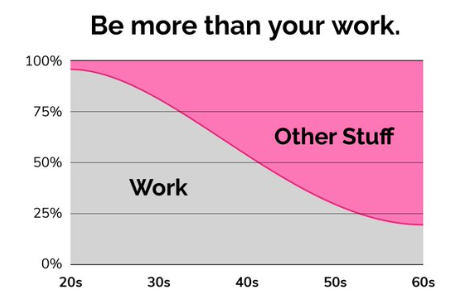Most people view “retirement” as a sharp break – working full-time one day, then suddenly doing nothing the next. This outdated mindset is flawed and often leads to problems later in life, leaving people disconnected and purposeless.
Instead, it is far better to think of retirement as a gradual shift.

Image source (Kevin Dahlstrom’s tweet)
Early in life, work dominates out of necessity, driving how you spend your time and shaping your identity. But this approach has serious downsides:
- Work’s Fading Appeal – Work loses its shine over time. When people say “I love my work,” they often mean it’s all they have. There’s more to life than another milestone or deal.
- Health Demands Time – As you age, prioritising health becomes critical to maintain high performance in all areas.
- One-Dimensional Limits Growth – A one-dimensional life limits your chance to explore passions while you’re still young. You need space for those to grow.
This pattern is seen repeatedly among “successful” people with wealth and status, but sadly, with hollow lives. It’s more common than you’d think, and it’s a warning sign.
Ideally, the goal should be to slowly gain (back) control over your time and build a multi-faceted identity.
Here’s the key: this won’t happen without intentional effort. It requires deliberate action.
Life unfolds in seasons. There’s a time for grinding, but always with the end in mind. Plant seeds for what’s next, ensuring you’re not left empty when work’s grip loosens.
Dr. Howard Tucker, a neurologist, is the world’s oldest practising doctor at 102. He attributes his longevity to staying mentally and physically active, warning that idleness kills. He once said, “Retirement is the real enemy of longevity. If you stop working, learning, moving… It’s like telling your body and mind they’re obsolete.”
He still walks five kilometres a day, keeps learning, and got his law degree at a ripe ‘young’ age of 67. At his age, many people are just waiting for life to pass by. But he keeps studying, walking, and working. Not out of duty, but out of conviction. Because nothing is more dangerous than standing still. Even the heart rusts if you don’t use it. Tucker emphasizes that remaining engaged – whether through work or meaningful activities—keeps the mind sharp and body resilient, a lesson he learned from his own experience and from his father, who practised medicine into his late 80s.
His advice: Don’t retire from life. Retire from inaction.
And as Kevin Dahlstrom tweeted (link) – Retirement is a trap. The end goal of a career is not to suddenly stop working & live a life of leisure. Humans NEED the stimulation & fulfilment that comes from challenging work.
I will digress a bit here, given my profession as an investment advisor. A long life is good and desirable, but we also need to ensure that we don’t run out of money before running out of years! You don’t want to be old and without money. Isn’t it? So please do read the following (financially) contextual articles I have written over the years about this:
This may sound odd to workaholics, but you are more than your work. Redefining retirement as a gradual shift rather than an abrupt halt empowers individuals to cultivate a vibrant, multi-dimensional life. By intentionally nurturing diverse interests, prioritising health, and staying engaged—whether through work, learning, or meaningful pursuits—you can avoid the emptiness that often follows a work-centric existence. Embrace each season with purpose, plant seeds for growth, and retire not from life, but from inaction, ensuring your later years are rich with meaning and resilience.











































